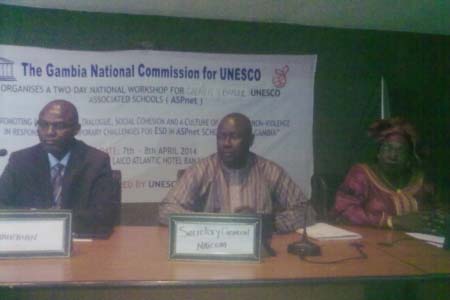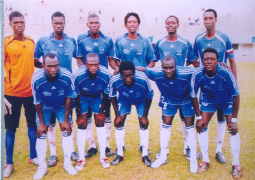
UNESCO is intensifying national training in promoting intercultural dialogue, social cohesion and a culture of peace, non-violence and supporting the education systems response to contemporary challenges for ESD for UNESCO ASPNET school coordinators and students.
The latest two-day training attended by students from different schools in the Greater Banjul Area, was held at the Laico Atlantic Hotel in Banjul on Monday.
Speaking at the training, the secretary general of the Gambia National Commission for UNESCO and National Coordinator UNESCO ASPnet, Yahya Al-Matarr Jobe, said UNESCO’s association school project Network (ASPNET), commonly known as UNESCO, was founded in 1953, originally consisted of 33 participating schools in 15 member states.
But as at now, he said, the global network comprises 10,000 educational institutions in 181 countries, ranging from pre-school, primary and secondary schools to teacher training institutions, working to support quality education in practice in both rural and urban settings.
Mr Jobe said as the world’s largest network of schools, ASPnet serves as a laboratory for innovative pedagogical approaches, and strives to support teachers and students in their efforts to address today’s changing educational needs and tomorrow’s challenges.
The network, he said, was structured around the four goals - UN priorities, education for sustainable development, peace and human rights and intercultural learning - particularly by strengthening the four pillars of education: “learning to know, learning to do, learning to be and learning to live together” as stated in the 1996 Delores Report.
He said The Gambia being home to twenty-two UNSECO Association schools located in both the rural and urban areas of the country could therefore be used a as vehicle to combat all forms of discrimination and contemporary forms of enslavement in the country.
According to him, the aim of the training was to facilitate and enable a fruitful intercultural dialogue, interaction and a common commitment to combat all forms of discrimination and contemporary forms of enslavement in the country.
Hence, reinforcing The Gambia’s determination to join with others around the world to educate and stimulate dialogue among civilizations, he added.
“Series of planned activities under this project will eventually contribute to the educational component of the United Nations Decade for ESD 2005-2014,” he disclosed.
He said the SANDWATCH and the ‘’ADOPT a Village’’ project would better the children, young people and members of their communities to respond to some contemporary challenges of ESP in ASPnet schools in The Gambia.
He urged the students to make best use of the training and disseminate the knowledge and skills learned for the promotion of global citizenship, peace education and education for sustainable development of ESP.
Ebrima Sisawo of the department of education said the ministry of education was delighted to be associated with the national training seminar for ASPNET school coordinators and students of the greater Banjul associated schools ASPNET under the 2012-2013 participation programmes funded by UNESCO.
He commended the National Commission for UNESCO and the Gambia associated schools project Network ASPETNET for their foresight in organizing the training workshop on a pertinent global issue that would continue to affect the lives of everyone in the nation for many decades to come.
“The world is a global village, every little effort towards environmental protection, conservation and preservation pays dividend in our global effort to make this planet a better place for us teachers and students being trained to increase environmental awareness and promote effective public participation and community environmental management processes within and outside the schools,” he said.
He said the schools and their communities are inter-related, therefore there was great need for the schools to plough back to their respective communities the sustainable knowledge they learnt on environmental protection so that the communities too could practise them.



